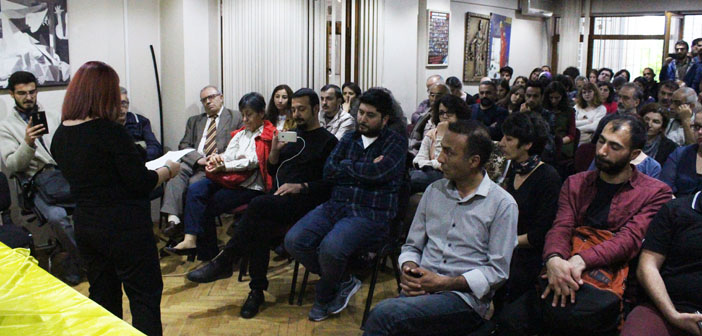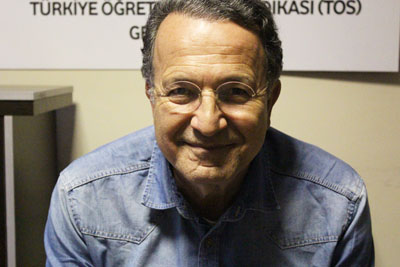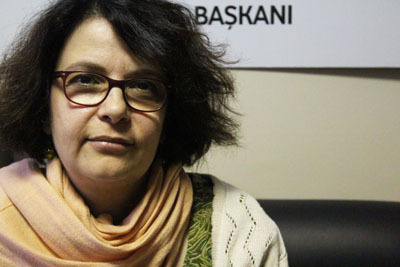Şehrini terk etmeyip direnen akademisyenlerin hikâyesi


FATİH GÖKHAN DİLER
UYGAR GÜLTEKİN
11 Ocak 2016 tarihinde yayınlanan ‘Bu suça ortak olmayacağız’ başlıklı bildiriyi imzalayan akademisyenler, Cumhurbaşkanı Recep Tayyip Erdoğan’ın kendileri için “müsvedde", "karanlık", "zalim", "alçak" gibi ifadeler kullanarak "ilgili kurumları gereğini yapmaya" çağırmasıyla beraber hayatlarında yeni ve zorlu bir döneme girmişti. İlk etapta 1128 kişi olan imzacı sayısı Erdoğan'ın bu çağrısına tepki olarak ülke genelinde hızla arttı. Üniversite yönetimleriyse Erdoğan’ın çağrısını uyarak akademisyenler hakkında soruşturmalar açmaya başladı.
‘Pilot bölge’
Soruşturmalar devam ederken yaşanan 15 Temmuz darbe girişimiyse olağanüstü hal ve kanun hükmünde kararnameler dönemini hayatımıza soktu. 2 bin 346 akademik personeli ihraç eden 1 Eylül 2016 tarihli 672 sayılı KHK, ‘Bu suça ortak olmayacağız’ bildirisine imza atmış olan akademisyenler için de bir haber veriyordu. İhraç listesine bakanlar Kocaeli Üniversitesi’nden bu bildiriyi imzalayan 19 akademisyenin de ismini görüyordu. Bildiriden sonra süreç Kocaeli’nde öyle bir ilerlemişti ki, barış imzacısı akademisyenlerinin tabiriyle bu şehir adeta bir ‘pilot bölgeye’ dönüşmüştü.
Kocaeli Üniversitesi’nden bildiriyi imzalayan akademisyenler, haklarında üniversitenin başlattığı idari soruşturmanın dışında, 15 Ocak 2016'da evlerinde gözaltına alınma ve haklarında cezai soruşturma işlemiyle de karşı karşıya kalmıştı. Kocaeli’ndeki akademisyenler aynı zamanda bildiriyi imzaladıkları için ihraç edilen ilk akademisyeneler oldu. Başlayan ihraç dalgası de hız kesmeden devam etti. İhraçların yanı sıra sözleşmeli olarak çalışan pek çok akademisyenin sözleşmeleri yenilenmedi.
İntihar ve açlık grevi
Üniversitelerdeki kıyımla beraber hayatını akademik üretime adamış ve geleceklerini de bu yönde kurmuş bu kişilerin yaşamı da alt üst oldu. Akademisyenlerin pek çoğu hem ‘varlık sebebimiz’ dedikleri çalışmalarından oldu hem de ekonomik olarak ağır bir sürecin içine düştüler. Çukurova Üniversitesi İktisadi ve İdari Bilimler Fakültesi’nden akademisyen Mehmet Fatih Traş’ın sözleşmesi 6 yıl çalıştığı üniversitesi tarafından yenilenmedi. Traş 25 Şubat 2017’de intihar ederek hayatına son verdi. Akademisyen Nuriye Gülmen de 6 Ocak 2017'de yayınlanan 679 sayılı KHK ile ihraç edilmişti. Gülmen, işine geri dönmek için başlattığı açlık grevinde, kalıcı sağlık sorunları için kritik eşik kabul edilen 60’lı günleri geride bıraktı.
İhraçlar aynı zamanda pek çok kentte yeni direniş modellerini ortaya çıkarttı. Akademisyenler, hem çalışmalarından hem de öğrencilerden kopmamak için alternatif çalışma alanları yaratmaya başladı.
Alternatif akademi
İlk ihraçların yaşandığı Kocaeli de bir öncü olarak Türkiye’deki ilk dayanışma akademisine ev sahipliği yapıyor. İhraç edilen 19 akademisyen, hem kentten hem öğrencilerinden kopmamak için, hep bir ağızdan “Gitmiyoruz. Bu şehri terk etmiyoruz” diyerek sendika salonunda derslere devam ediyor. 28 Eylül 2016’daki yüksek katılımlı açılıştan sonra 5 Ekim’de derslere başlayan Kocaeli Dayanışma Akademisi’nde (KODA) ilk ders yılı, 24 Mayıs’taki ‘Kentsel mekâna dair iki kısa değerlendirme’ başlıklı seminerle tamamlanmak üzere. Açılacak yaz okulunun programıysa ‘kocaelidayanisma.org’ sitesinden takip edilebiliyor.
Ankara Üniversitesi’nden ihraç edilen iki akademisyen Aysun Gezen ve Kamuran Akın’ın dersini izlemek için Kocaeli Eğitim-Sen binasında çalışmalarına devam eden KODA’nın misafiri olduk. Akademisyenlerin hem karşı karşıya kaldıkları sorunları hem de heyecanla anlattıkları dayanışma akademisinin hikâyesini ve geleceğini konuştuk.
Kocaeli Üniversitesi’nden ihraç edilen akademisyenlerin tam listesi
Yrd. Doç. Dr. Adem Yeşiyurt, Doç. Dr. Aynur Özuğurlu, Yrd. Doç. Dr. Burcu Yakut Çakar, Yrd. Doç. Dr. Derya Keskin, Doç. Dr. Gül Köksal, Yrd. Doç. D. Güven Bakırezer, Doç. Dr. Hakan Koçak, Yrd. Doç. Dr. Hülya Kendir, Prof. Dr. Kuvvet İhsan Lordoğlu, Prof. Dr. Mehmet Cengiz Erçin, Doç. Dr. Mehmet Rauf Kesici, Dr. Mehmet Ruhi Demiray, Prof. Dr. Nilay Etiler, Prof. Dr. Onur Hamzaoğlu, Doç. Dr. Özlem Özkan, Prof. Dr. Ümit Biçer, Prof. Dr. Veli Deniz, Yrd. Doç. Dr. Yücel Demirer, Prof. Dr. Zelal Ekinci.
Lordoğlu: “Kararnameyi imzalayan oda arkadaşımdı”
Kuvvet Lordoğlu 672 sayılı KHK ile görevinden ihraç edildikten sonra sosyal güvenlik işlerini halletmek için başvurduğunda, kendisine toplamda 35 yıl 5 ay 14 gün akademisyenlik yapmış olduğu söylendi. O günden, yani Kocaeli Üniversitesi’ndeki on sekiz arkadaşıyla beraber ihraç edildiği 1 Eylül 2016’dan sonra hayatı hızla değişse de, değişmeyen tek şey akademisyence bir yaşam oldu. Devlet katında tutulan gün sayısına eklenmeyecek olsa da, Kocaeli Dayanışma Akademisi’nin en kıdemli hocalarından Lordoğlu, diğer arkadaşları gibi kenti terk etmeyip orada özgür bir hayat okulu kurmanın hayaliyle akademisyenliğe devam ediyor.
 Kuvvet Lordoglu
Kuvvet LordogluBarış imzacısı olmak
‘Bu suça ortak olmayacağız’ bildirisini imzalayanlardan biri olan Lordoğlu, “Ben hiç bıkmadım akademiden. Yeniden dünyaya gelsem yine akademiyi seçerim” diyor. Bir süre ayrılıp özel sektörü denese de orayı sevememiş. 1981’de girdiği üniversite için “Size bir ölçüde yetki verip bu yetkiyi size hissettiren bir yer. ‘Hocam’ lafının arkasında manevi bir haz var. Öğrencilerle beraber olmayı, akademiyi çok sevdim. Bir gün bu işler bitince geri dönmeyi çok isterim” diye konuşuyor.
Kocaeli, akademide ihraçların yaşandığı ilk şehir, Lordoğlu ve 18 arkadaşı da bu anlamda ilk ihraç edilen akademisyenler. Kocaeli’de de bugüne kadar diğer üniversite kentleri arasından sivrilip adeta öncülük eden bir dayanışma ve mücadele sergileniyor. KODA’daki bir sonraki dersi beklerken en sık işittiğimiz şeyse ‘Bu kenti terk etmeyeceğiz’ lafı oluyor. Lordoğlu, “Bizi bir arada tutan şey barış imzacısı olmaktı, hayat görüşü farklı olan insanları bir araya getiren bir çimento görevi gördü barış imzacısı olmak” diyor.
Cizre’den sonra
Eşi ve kendisi Ekim 2015’te Türk Tabipler Birliği’yle birlikte Cizre’ye gitmiş. “Orada yıkılan binaları, mermilerle delik deşik olmuş duvarları, perdelerle ayrılan mahalleleri gördüm. Sonrasında bildiriye imza atmakta hiç zorlanmadım. Bugün olsa yine imzalarım. Orada gördüğüm tanıklıklar öyle üstünden geçilecek şeyler değildi” diye imzacı olma sürecini anlatan Lordoğlu, “Şimdiye kadar pek çok şeye imza atmışız hiçbir şey olmadı, ama Cumhurbaşkanı Erdoğan’ın tepkisinden sonra ilk defa attığımız taş kurbağayı ürküttü dedim. Reklamımızı yaptı diye düşündüm. Onun tepkisi nedeniyle bir sürü insan ikinci imzacı oldu. Bir farkındalık sağladı. Bense şaşırdım. Böyle bir tepki beklemiyorum. KHK'yı ise hiç beklemiyordum. Bu FETÖ hareketiyle bizim bir ilgimiz yok. Bu başka bir şey… Açığa alma, uzaklaştırma falan bekliyorduk ama KHK beklemiyorduk. 15 Ocak’ta gözaltı olduğunda bizi karşılamaya gelen öğrencilerimiz vardı, başsavcı o zaman avukatlarımıza bize haklarını helal etsinler demiş. Ne kadar baskı altında olduklarını gösteriyor bu da. Eşimle beraber imzacı ve KHK’lı olduk. 15 gün içinde lojmanı boşaltmamız gerekti” diye konuşuyor.
Arkamdan bıçaklandım
O günden sonra sırt çevirenler olmuş, bazı meslektaşları ise kendisini aramayı bırakmış. Lordoğlu ve diğer on sekiz imzacıyı ihraç eden kararnamenin altındaki imzalardan birisiyse kendisinin üniversitedeki oda arkadaşına aitmiş. Lordoğlu kırgınlığını, “Ben onun doçentlik sınavına girdim. Evime gelip gidiyordu. Aynı kampüste oturuyoruz. Ben onun imza attığını sonradan öğrendim. Çok canım sıkıldı. Önce bir telefon edeyim dedim bir yanlışlık olmasın diye. Sordum böyle böyle imza attın mı diye, hatırlamıyorum dedi. Bu mümkün değil. Bölümdeki arkadaşlar sonradan ona çok sitem etmişler. ‘Atmasaydım beni FETÖ'cü mü sansınlar’ diye itirafta bulunmuş. Beni en çok üzen o olmuştu. Arkadan bıçaklamak gibi… Hiç ummadığın bir şey… Bazı meslektaşlar benimle çok sıkı ilişki içindeyken her şey kesildi. Arama sorma hepsi bitti. Geçen yolda gördüm birini ama görmezlikten geldim ki zor durumda bırakmayayım. Arkadan seslendi biraz konuştuk. ‘Geçmiş olsun diyemiyorum, ne diyeceğimi bilemiyorum’ dedi, geçmiş olsun demek sembolik bir şeydir. Seni destekliyorum demektir. Mahcup oldu. Uzaklaştı ama insan unutmuyor, zor geliyor” sözleriyle anlattı.
Köyde bir akademisyen
Lordoğlu ve eşi maddi sıkıntı yaşamamak için bir süre köyde yaşamaya karar vermiş, maddi ve manevi arkadaşlarından, dünyayla irtibatını kesip hiç konuşmayan kişilerden bahsedip ekliyor: “Çok zorlandı insanlar. Ben nispeten daha az zorlandım. Ev kiraları ev taksitleri olanlar var. İznik’in bir köyünde evim vardı. Haftasonu falan kullandığım bir ev. Gidecek yerimiz olmayınca oraya gittik. Köyün dışında biraz izole bir hayat… Toprakla uğraşmayı seviyorum. Ama çok konfor kaybına neden oldu. Sobayla ısınmaya başladık. Gazete almak için bilmem hangi köye gitmeye çalıştık. Kışı orada geçirdik. Küçük bir gelirle kiralık ev tutup geçinmeye çalışmak çok zor. İki kızım var. Torunum bile var. Yakın çevren çok daha fazla etkileniyor. Biz iyiyiz hayat devam ediyor. Onlar da üzüldü ama bir korku yok. Biz azla yetinmeyi becerdik. Ders vermek dışında akademik faaliyetlerimi yapmaya çalıştım. Yazı veya rapor…”
28 Eylül 2016 günü yapılan açılış festivalinin ardından 5 Ekim 2016`dan 12 Mart 2017`ye kadar süren bir seminerler programını yürüten KODA, bu haftalarda yine akademiden ihraç edilmiş, farklı şehirlerden akademisyenleri halkla ve öğrencilerle buluşturuyor. Lordoğlu ise KODA’nın geleceği için desteğe ihtiyaç duyduklarının altını çizip ekliyor, “Yaz okulu kuracağız. Biz yarıldıktan sonra kendilerini yalnız hisseden öğrenci arkadaşlarımız var. KODA’yı sürdürülebilir bir hale getirmek için çabalıyoruz.”
Keskin: “KODA bizim varlık nedenimiz”
Kocaeli Dayanışma Akademisi’nde en çok işittiğimiz sözler hiç şüphesiz ‘bu şehri terk etmiyoruz’ oluyor. Kocaeli Üniversitesi’nden KHK ile ihraç edilen on dokuz akademisyenden on beşi, 28 Eylül’de coşkulu bir başlangıçla açtıkları yolla pek çok başka dayanışma akademisinin kurulmasına da ön ayak olmuş ve hatta meslektaşlarını bu anlamda cesaretlendirmişti.
Derya Keskin
İlk dayanışma akademisi
KODA’daki en aktif kişilerden barış akademisyeni Derya Keskin kuruluş sürecini “Gitmiyoruz, bu şehri terk etmeyeceğiz diye karar vermiştik, sonra bunu nasıl yaparız diye düşündük. ‘Bu düşünceyi bugüne kadar yaptığımız şeyi yapmaya devam ederek gerçekleştiririz ancak’ dedik. Biz akademisyeniz, yazıp çiziyoruz, anlatıyoruz, öğrencilerimizle karşılıklı olarak gelişiyoruz. Bunu nasıl yaparız diye düşünürken bir akademi kurmaya karar verdik. Ne isim koyacağız diye de uzun uzun tartışıp sonunda ‘dayanışma akademisi’ olarak karar verdik. Dayanışma bizim için önemliydi. ‘Barış akademisi’ seçeneğini de düşünmüştük. Başka şehirlerde dayanışma dersleri vardı ama akademi olarak ilk dayanışma akademisi KODA. Sonra başkaları da kuruldu. Açılışımız çok coşkuluydu, farklı kurumlardan çok sayıda arkadaşımız geldi” diye anlatıyor.
Halkla iç içe üniversite
5 Ekim’de, Güven Bakırezer’in ‘İfade hürriyeti ve epistemolojik temelleri’ başlıklı dersiyle başlayan seminerler, her hafta çarşamba günü, Eğitim-Sen Kocaeli Şubesi’nde halkla ve öğrencilerle buluşmaya devam etti. Derya Keskin, “İlk seminerler en kalabalık olanlar oldu. Sonradan tabii sayı biraz azaldı. 15 hafta boyunca her birimiz birer seminer verdik. Kendi seminerlerimiz bitti. Herkes birer kere verdi. Özel olarak hazırlamadık. Sadece kent halkı ve öğrencilerle buluşmak için kendi alanlarımızda konuşmalar yaptık. Tartışmalar oluyordu. Öğrencilerin yanı sıra emekliler de çok geliyor. Öğrencilerin olmadığı dönemde bir iki hafta ara vermek durumunda kaldık ama onun dışında sürekli devam ettik. Sadece seminerlerde de bir arada olmak istemedik. Süreç kendini yarattı. Gazeteciler, televizyoncular geldi, daha çok Avrupa’dan geldiler. Bizi duyanlar başka konular için bizimle konuşuyorlar. Mesela Almanya’da bir eğitim sendikası dayanışma için ülkelerinde bir çalıştay yapmak istedi. Nasıl bir dayanışma kurgulanır diye… Bizim pasaportlarımız iptal edildiği için oradaki arkadaşlarımız katılacak. Seminerlerin olduğu Çarşamba günleri sabahtan buluşuyoruz. Gündemimizi hep bizden beklenenler belirliyor. Seminerlerden sonra bir forum düzenlemek istiyoruz. Geçtiğimiz bir yılı değerlendirip önümüzdeki dönemde ne yapılabilir diye düşünüyoruz” diye KODA’da bugüne kadar yaşananları özetleyip daha ciddi projelerin olduğundan, iki yıllık bir hayat okulunu hayata geçirmek için girişimleri olduğundan bahsediyor.
İki yıllık program hazır
KODA bir tüzel kişilik kazanmak için dernekleşme çabası içinde. Ancak OHAL koşulları bu süreci tıkıyor. 1 Mart’ta yapılan başvuru ilk etapta eksikler olduğu gerekçesiyle geri çevrilmiş. Normal koşullarda dernek kurmak için bunu beyan etmek yeterli olsa da OHAL dönemlerinde bu konuda bir inceleme yapılması gerekiyormuş. Keskin, “Bizi kurulmuş saymadılar. 1 Nisan’da gittik sorduk, hiçbir şey söylemiyorlar. OHAL var diyorlar. OHAL’i gerekçe gösteriyorlar sürekli. Biz kurumsal olarak bir tüzel kişilik kazanmasak da bir kurum olarak çalışıyoruz. Bir tüzük hazırladık. Onlar kabul etmese de biz yayınladık tüzüğü. Türkiye’de uzun vadeli planlar yapmak çok zor. Bir yıl önce böylesi bir şeyi tahayyül dahi edemezdik. Hayatımız tamamen değişti bir anda. KODA’yı kurmanın birden çok nedeni var. Kentle, öğrencilerle bağımızı koruyarak, yaptığımız şeyi yapmaya devam etmek istedik. Biz maaş akademisyeni değiliz. Maaşsız da yaparız bunu. Ama bunun koşulları var. Teknik, fiziki ve ekonomik koşullar var. Eğitim-Sen’i fiziki olarak kullanıyoruz, bu sürdürülebilir. Biz daha alternatif, eğitimi de daha alternatif yapabilen bir arayış içindeyiz. İki yılık bir program hazırlıyoruz. Herkes kendi araştırmaları için çalışmalar yapıyor. Fon başvuruları yapıyoruz. Destek aldığımız çalışmalar var. En büyük projemiz bu iki yıllık program. İki yıl burada yaptığımız işi alternatif bir biçimde yapmaya devam ederek geçecek. Bu zaten amaçladığımız da bir şey. Bu bizim varlık nedenimiz. Türkiye’deki alt üst oluş karşısında bir konum almak. Dayanışma akademisi olmanın nedeni de bu. Diğer akademilerle de beraber bir şeyler yapmaya çalışıyoruz. Toplam on iki tane akademi var şu anda” diye KODA’nın gelecekle ilgili planlarından bahsediyor.
“Bu duruma alışmayın”
Bugün akademide bulunan meslektaşlarına da seslenen Keskin, “Beni yaralayan bir şey varsa o da insanların bu duruma alışmış olmaları. ‘Gittiler ve devam ediyoruz. Maaş almaya devam ediyoruz, akademisyen olmaya devam ediyoruz’ demek bu kritik bir şey. Tabii ki kederlerinden ölmesinler ama alışmış olmaları bazı arkadaşlarımızın geleceklerinden olma halidir. Bu durumu kabullenmeleri benim için en yaralayıcı şey. Tabii ki yanımızda olmalarını isteriz. Biz eylemler de yapıyoruz. Son KHK’dan sonra öğrenciler hocalarımızla beraberiz diye eylem yaptılar. Gazlı suyu yedik. Dayak yedik. Ne zaman sokağa çıksak dayak yiyoruz. Polisler Derya Hanım diye seslenip dayak atıyorlar. Beraber olduğunuz bazı arkadaşlar Eğitim-Sen’den istifa etti. Bizi destekleyen tek kurum Eğitim-Sen, bizim evimiz artık burası. Buradan istifa edince artık beni desteklemiyorsun demek oluyor. Beni görünce selam veriyor olmalarının artık bir anlamı kalmıyor” diye konuştu.
Kayhan: “Arkadaşlarım atılırsan çok rahatlayacaksın diyor”
Kocaeli Dayanışma Akademisi’nin açılış etkinliklerini takip edenler, KHK ile ihraç edilen on dokuz akademisyenden sonra Kocaeli Üniversitesi’ndeki durumu anlatan bir konuşmacıya da kulak verdiler. Cumhurbaşkanı Tayyip Erdoğan ‘Bu suça ortak olmayacağız’ başlıklı bildiriye imza atan 1128 akademisyen için "ilgili kurumları gereğini yapmaya" çağırdıktan sonra, bu çağrıya tepki olarak bildiriyi imzalayan ikinci grupta yer alan Aslı Kayhan, KODA’nın açılış gününde “Üniversitede başka türlü OHAL işletilir halde, üniversite adeta açık hapishaneye dönüştürülmüş durumda. Kapılar kimlik kontrolleri için uzun kuyruklar oluyor. İçeride güvenliğin sürekli bizi takip ettiği, herkesi baskı altında tuttuğu bir ortam var. Dersler hiç ruhu olmayan dersler” diyordu.
 Aslı Kayhan
Aslı Kayhan“Orası bir üniversite değil”
Ruhu dayanışma akademisinde, bedeni ise üniversitede, adeta arafta kalmış bir akademisyen Aslı Kayhan. “Şu an çalışmam çok zor. Akademik bir şeyin içindeymiş gibi hissetmiyorum. Orası bir üniversite diye gitmiyorum. Orası şu an bir üniversite değil. Bunu içerdeki arkadaşlara hakaret için söylemiyorum. Orada yaptığımız işin akademik faaliyet olduğunu düşünmüyorum” diyor. Sosyoloji bölümündeki Kayhan’ın araştırma alanı dayanışma kültürü ve işçi sınıfı. Oda arkadaşı akademisyenler üniversiteden ayrılırken de kafasındaki en büyük soru ‘ne yapacağım’ olmuş. İlk düşündüğü şeyse bir dilekçeyle akademiden ayrılmakmış.
“Akademi orası değil burası”
“Arkadaşlar ‘gerek yok’ dedi. Sonuçta üniversite de bir mücadele alanı… Geri döneceğiz dediğimiz yer orası. Kamu orası. Mesele şu ki kamu onlar değil kamu biziz. Bu kamu hizmetini de geri alacağız. Sırf bu mücadeleyi veren biri olarak orada bulunuyorum” diyen Kayhan, zaman zaman nasıl geçinirim, nasıl olur diye kaygılandığını ama KODA kurulduktan sonra bu kaygıların da ortadan kalktığını söylüyor: “Kendi aramızda yaptığımız toplantıda bu kenti terk etmeyeceğiz diye karar almıştık. Benim yüzüm bu yana bakıyor. Ben akademik faaliyetlerimi burada yürütüyorum. O kaygıyı da taşımıyorum. Her sabah üniversiteye giderken kendimi ayrıca telkin etmem gerekiyor. Arkadaşlarım da tabii ki atılırsan çok rahatlayacaksın diye söylüyor. Kendimi özgür hissettiğim tek yer sınıf. Sosyoloji dersi veriyorum. Dışardakinden bağımsız bir şey anlatıyorum. Öğrencilerime söyledim. Bütün ders programını böyle revize etim. Meslek hayatımın en önemli anını yaşadığımı söyledim, en az motivasyonla çalıştığım bir dönem olduğunu ama okula gelmek istediğimi söyledim. Bir grup bunu çok açık anladı. Atılabileceğim kaygısında olan öğrenciler de var. Derslerimde sözümü sakınmıyorum.”


